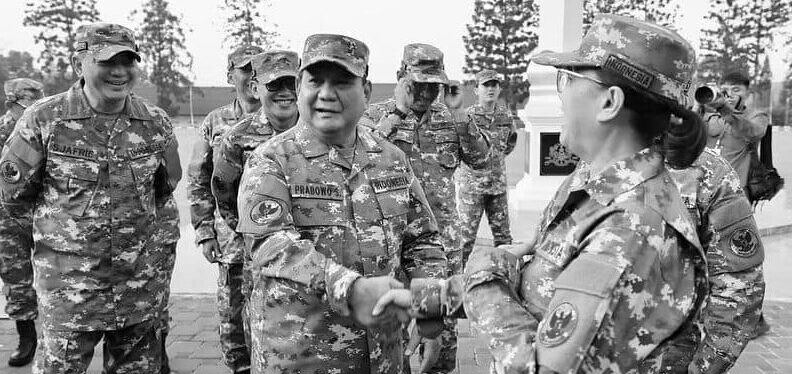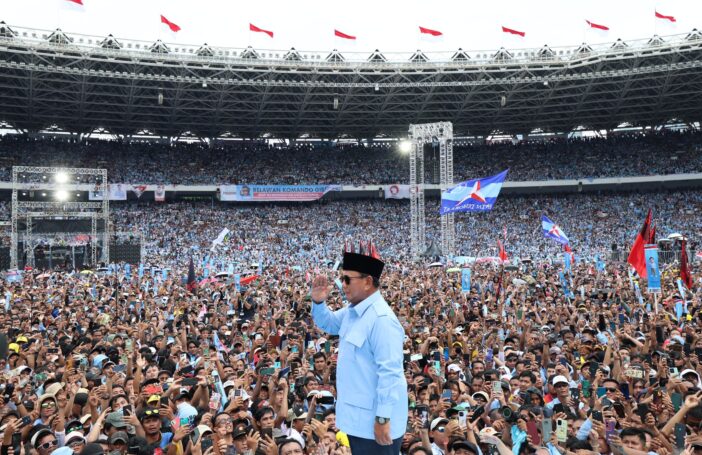On 20 October 2024, Prabowo Subianto was inaugurated as Indonesia’s eighth president, capping a stunning political comeback from the once-ostracised former general but also marking a new low point for the country’s beleaguered democracy. Prabowo will have little interest in addressing the country’s democratic backsliding of recent years and in fact could see it slide further. Australia and other development partners will face difficult choices over whether and how to support local pro-democracy forces seeking to push back against growing repression.
Despite often being praised as one of the world’s largest democracies, Indonesia has suffered a serious decline in the quality of its democracy in recent years. Much of the foundation for this decline was laid during the reign of former president Joko Widodo.
During his two terms, Widodo took key institutions from the democratic reform (reformasi) period and bent them to his will. He stripped the once-vaunted Anti-Corruption Commission (KPK) of its independence, making its leaders political appointees and pushing it to investigate his enemies while ignoring graft among his allies. He also intervened in the previously fiercely independent Constitutional Court, leaning on the Court’s chief justice (who not-so-coincidentally is Widodo’s brother-in-law) to tweak election rules and enable Widodo’s eldest son, Gibran Rakabuming Raka, to run as Prabowo’s vice presidential candidate. Widodo also deployed a mix of incentives and legal intimidation to subdue parliament, reducing it to being a mere rubber stamp for the executive.
Prabowo now inherits this weakened Indonesian democracy and is unlikely to alter its downward trajectory. Despite a colourful rebranding as a cuddly grandpa during February’s national elections, he still carries a deep and longstanding scepticism of the value of democracy. Just prior to his inauguration, he dismissed parliamentary opposition as “western culture”, not aligned with Indonesian values. His governing style may also have a distinctly militaristic flavour. One of his first acts as president was to order cabinet ministers to attend a four-day boot camp — complete with ministers standing on parade in army fatigues — to ensure they “are all in sync”.
Prabowo’s approach to the economy will also likely reflect his old-school strongman persona. Economic populism — perhaps best represented by his signature “free lunch” program for school children and mothers — will be a selling point for the masses. But there are fears cronyism will also be rife, with Prabowo’s brother and oligarch businessman Hashim Djojohadikusumo likely to seek returns for bankrolling Prabowo’s three previous tilts at the presidency. Prabowo also looks set to continue his predecessor’s courting of Chinese investment in particular, likely bringing with it further support for Beijing’s authoritarian model of development.
If Indonesia is to turn around its democratic fortunes, civil society will likely be the main driver for change. In recent years, activists, academics and NGOs have grown increasingly critical of government efforts to roll back civil liberties and neuter checks and balances on its power. Prabowo is the resurrected embodiment of the authoritarian era many activists fought against in the late 1990s and have no desire to see return. So, ironically, he’s likely to generate energy and defiance from activists in a way which they were unable to muster against Widodo — whom many activists backed in his 2014 and 2019 presidential bids — until it was too late.
Pro-democracy forces will need this energy because they’ll be starting almost back at square one. Many of the institutions they fought so hard to establish over the past two decades have either been sidelined or co-opted by political elites. Activists and NGOs are also divided and under-resourced. Some have been locked out of government funding for being too critical, while those who have access often serve only as passive “implementing partners” of state programs.
Activists will need to show how maintaining healthy democratic processes and institutions is critical for the achievement of longer-term, sustainable economic outcomes for Indonesians. High satisfaction levels with Indonesia’s democracy, despite its many deficiencies in recent years, have largely been based on Widodo’s ability to ensure stable growth and low inflation. Prabowo will be keen to maintain this record but any economic shocks could rattle public contentment and bring questions about the quality of Indonesian democracy back to the fore.
The likelihood of a generally more combative relationship between civil society and government will present a dilemma for international development partners, including Australia. The “partnership” focus of development to date, where donors’ support is guided by government priorities, has proven to be very successful when national governments and civil society are aligned. But it raises the risk of donors being locked into backing the government in disputes over the focus and trajectory of reform, even when civil society’s criticisms might be justified.
The partnership approach and its focus on technical support has undoubtedly been well-received by the Indonesian Government. Australian-supported programs like the Australia-Indonesia Partnership for Economic Development (Prospera) and the Australia-Indonesia Partnership for Justice have provided expert support on inclusive economic development and judicial reform efforts. But some academics have also expressed concern that as Indonesia’s democratic slide continues, such support may result only in assisting co-opted or increasingly corrupt institutions to provide unfair outcomes more efficiently.
So, more support will likely be needed for forces seeking to restore the democratic foundations of Indonesian institutions. Initially, donors seeking to maintain a partnership approach could find ways to support reformers within existing government frameworks. Key among these is the Long-Term Development Plan (RPJPN), which outlines Indonesia’s development priorities from 2025 to 2045. Although some of the RPJPN’s goals are aspirational and may be subject to Prabowo’s whims, they have legislative standing, giving them weight and a common platform for government and civil society for now.
But if the partnership-oriented approach meets roadblocks, donors could also build on existing support for local reformers channelled through established international NGOs. Renewing Australia’s Democratic Resilience (DemRes) pilot program, which partnered with the International Foundation for Electoral Systems and The Asia Foundation, would be a good start. But it would need to expand beyond just strengthening technical and procedural elements of democracy, which are mostly functioning, and focus more on promoting democratic values and institutions and helping reformers make the case that they lead to better, sustainable, long-term economic outcomes for all Indonesians.
As for other parts of the bilateral relationship, Australia will eventually face hard choices in its development partnership with Indonesia over the next five years. How Canberra responds to the likely impending conflict between pro-democracy forces and the Prabowo administration will reflect not only how we view Indonesia as a bilateral partner, but also the value we place on democracy at home, in our region and the world.




